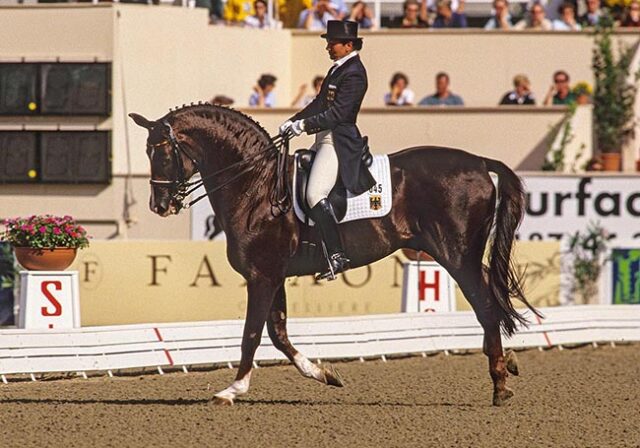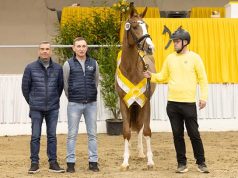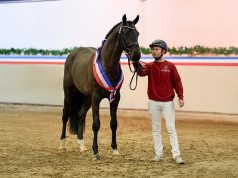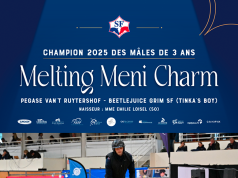By Christopher Hector
Photography: Peter Llewellyn
Donnerhall was a colossus towering over the development of the modern dressage horse, siring great competitors and, more importantly, wonderful sires who themselves sired competitors and sires, and grandsons who were great sires…
There is no other stallion who has had as much influence on dressage breeding as Donnerhall. The liver chestnut stallion was the first in so many areas. He was not, however, the first dressage sire to successfully compete internationally; that honour belongs to the Swede, Gaspari.
Donnerhall was the founding stallion at one of the first truly glamorous Oldenburg private studs – Grönwohldhof. It was a trend that was to strengthen and grow as the private studs that reflected the affluence and taste of their mega-rich owners mushroomed. Grönwohldhof, with its mill pond and waterwheel, its beds of azaleas, and picture-perfect paddocks with foals with neatly trimmed tails, threw out the challenge taken up by later establishments like Gestut Famos where the magnificence of the setting overwhelmed the breeding operation. Sadly of recent years, the trend has been reversed, and many of those famed Oldenburg studs – including Grönwoldhof – have disappeared.
But beautiful as Grönwohldhof may have been, it was also brilliantly designed, and laid out so that the founder Otto Schulte-Frohlinde, who was confined to a wheelchair, could observe all of the operations of the establishment via closed circuit vision in the central control room, from which the various wings of the main stud building fanned out. But Grönwohldhof was as important as a rider training centre as it was a breeding oasis.
At the heart of the stud, there was the central round court, usually packed with the luxurious tack boxes of visiting teams, celebrity riders, and the rich and hopeful. Off to one side, in the centre of the riding hall sat Herbert Rehbein, like some oriental pasha, surrounded by his followers, as he directed the activities of the dozen or so riders in the school at any one time. And what riders he produced! Riders like Martina Hannöver, Ingo Pape, Susan Draper (now Pape), Falk Rosenbauer, who came out of the stables themselves – and visitors from all over the world. The whole Swedish team was there much of the time. The Americans were there, the Finns, the English. And while Grönwohldhof was a magnet for riders, Donnerhall as one of the first superstar stallion competitors, was a magnet for mare owners…
It must be admitted that Donnerhall hardly comes from a ‘good family’. His sire, Donnerwetter disappeared into the wilds of the United States in the mid seventies, but while there are a couple of Donnerwetters ‘gracing’ the German dressage arenas, they were pretty ugly, untalented creatures. Even Donnerhall’s famous rider, Karin Rehbein noted in an interview I conducted in 2000, that despite the large number of foals Donnerhall has sired, she had yet to find one that matched up to the stallion. “There are a lot of Donnerhalls who have a little similarity to him but it is difficult to get another just like him,” said Karin. “Look at Donnerhall’s full-brothers, you couldn’t compare any of them to him. In appearance, in everything about him, the full brothers don’t come anywhere near Donnerhall. There were even two brothers who competed Grand Prix, but they were nothing compared to Donnerhall. They don’t even look the same, don’t move one little bit the same.”
It’s interesting, that all the super stallions who made up the dressage big three, Donnerhall, Weltmeyer, and Rubinstein, had full siblings who were very ordinary. Indeed one day, long ago, I was offered Rubinstein’s full-brother for very little money, but was not even tempted, he moved like a startled chook [slang for an adult chicken]... To read the complete article you need to be a subscriber
CLICK HERE TO SUBSCRIBE TO BREEDING NEWS
SUBSCRIBERS CAN READ THE COMPLETE ARTICLE BY LOGGING IN AND RETURNING TO THIS PAGE




